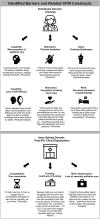Palliative Care in Survivors of Critical Illness: A Qualitative Study of Post-Intensive Care Unit Program Clinicians
- PMID: 37831930
- PMCID: PMC10771886
- DOI: 10.1089/jpm.2023.0034
Palliative Care in Survivors of Critical Illness: A Qualitative Study of Post-Intensive Care Unit Program Clinicians
Abstract
Background: Survivors of critical illness experience high rates of serious health-related suffering. The delivery of palliative care may assist in decreasing this burden for survivors and their families. Objectives: To understand beliefs, attitudes, and experiences of post-intensive care unit (ICU) program clinicians regarding palliative care and explore barriers and facilitators to incorporating palliative care into critical illness survivorship care. Design: Qualitative inquiry using semistructured interviews and framework analysis. Results were mapped using the Consolidated Framework for Implementation Research. Setting/Subjects: We interviewed 29 international members (United States, United Kingdom, Canada) of the Critical and Acute Illness Recovery Organization post-ICU clinic collaborative. Results: All interprofessional clinicians described components of palliative care as essential to post-ICU clinic practice, including symptom management, patient/family support, facilitation of goal-concordant care, expectation management and anticipatory guidance, spiritual support, and discussion of future health care wishes and advance care planning. Facilitators promoting palliative care strategies were clinician level, including first-hand experience, perceived value, and a positive attitude regarding palliative care. Clinician-level barriers were reciprocals and included insufficient palliative care knowledge, lack of self-efficacy, and a perceived need to protect ICU survivors from interventions the clinician felt may adversely affect recovery or change the care trajectory. System-level barriers included time constraints, cost, and lack of specialty palliative care services. Conclusion: Palliative care may be an essential element of post-ICU clinic care. Implementation efforts focused on tailoring strategies to improve post-ICU program clinicians' palliative care knowledge and self-efficacy could be a key to enhanced care delivery for survivors of critical illness.
Keywords: CFIR; ICU survivor; critical illness survivorship; palliative care; post-ICU clinic; qualitative research.
Conflict of interest statement
No conflicts of interest declared by the authors. This does not necessarily represent the views of the U.S. government or the Department of Veterans Affairs.
Figures
References
-
- Butcher BW, Eaton TL, Montgomery-Yates AA, Sevin CM. Meeting the challenges of establishing intensive care unit follow-up clinics. Am J Crit Care 2022;31(4):324–328. - PubMed
Publication types
MeSH terms
Grants and funding
LinkOut - more resources
Full Text Sources
Medical



